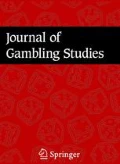Abstract
Little empirical investigation has been made of the relationship between personality and gambling play style. In an observation of on-table poker behavior, this study classified 44 players competing in an amateur league (43 male; mean age 32) according to two main dimensions of play style; tight or loose and aggressive or passive. Superstitious beliefs towards the game were additionally measured. The NEO-PI-R questionnaire (Costa and McCrae, Revised NEO personality inventory (NEO-PI-R) and NEO-five factor inventory (NEO-FFI) professional manual, 1992) was used to measure personality according to the five-factor model. Results showed players with superstitious beliefs to be significantly higher in neuroticism and lower in conscientiousness and than those with no superstitious beliefs. Results approaching significance showed players adopting an aggressive style to be higher in extraversion than passive players and superstitious players to be lower in extraversion than non-superstitious players. Analysis of play style according to age of player revealed a significantly higher mean age among loose compared to tight players. Implications of results concerning validity of these style classifications and potential development in future work are discussed.
Similar content being viewed by others
References
Bagby, M. R., Vachon, D. D., Bulmash, E. L., Toneatto, T., Quilty, L. C., & Costa, P. T. (2007). Pathological gambling and the five-factor model of personality. Personality and Individual Differences, 43, 873–880.
Cook, M., McHenry, R., & Leigh, V. (1998). Personality and the national lottery. Personality and Individual Differences, 25, 49–55.
Costa, P. T., & McCrae, R. R. (1992). Revised NEO personality inventory (NEO-PI-R) and NEO-five factor inventory (NEO-FFI) professional manual. Odessa, FL: Psychological Assessment Resources.
Demaree, H. A., DeDonno, M. A., Burns, K. J., & Everhart, D. E. (2008). You bet: How personality differences affect risk-taking preferences. Personality and Individual Differences, 44, 1484–1494.
Dickerson, M., Cunningham, R., England, S. L., & Hinchy, J. (1991). On the determinants of persistent gambling III. Personality, prior mood and poker machine play. Substance Use and Misuse, 26(5), 531–548.
Kim, S. W., & Grant, J. E. (2001). Personality dimensions in pathological gambling disorder and obsessive-compulsive disorder. Psychiatry Research, 104, 205–212.
Kyngdon, A., & Dickerson, M. (1999). An experimental study of the effect of prior alcohol consumption on a simulated gambling activity. Addiction, 94, 697–707.
Lakey, C. E., Rose, P., Campbell, W. K., & Goodie, A. S. (2007). Probing the link between narcissism and gambling: The mediating role of judgment and decision-making biases. Journal of Behavioral Decision Making, 21(2), 113–137.
Philips, J. G., Butt, S., & Blaszcynski, A. (2006). Personality and self-reported use of mobile phones for games. Cyberpsychology and Behavior, 9(6), 753–758.
Schoonmaker, A. N. (2000). The psychology of poker. Nevada: Two Plus Two Publishing.
Whitson, J. A., & Galinsky, A. D. (2008). Lacking control increases illusory pattern perception. Science, 322, 115–117.
Wiseman, R., & Watt, C. (2004). Measuring superstitious belief: Why lucky charms matter. Personality and Individual Differences, 37(8), 1533–1541.
Wood, W. S., & Clapham, M. M. (2005). Development of the drake beliefs about chance inventory. Journal of Gambling Studies, 21(4), 411–430.
Acknowledgement
We would like to thank Dr. Daniel Levitin and Dr. Theo Koulis for their guidance on the analysis of this study.
Author information
Authors and Affiliations
Corresponding author
Rights and permissions
About this article
Cite this article
Brown, S.C., Mitchell, L.A. An Observational Investigation of Poker Style and the Five-Factor Personality Model. J Gambl Stud 26, 229–234 (2010). https://doi.org/10.1007/s10899-009-9161-9
Published:
Issue Date:
DOI: https://doi.org/10.1007/s10899-009-9161-9




